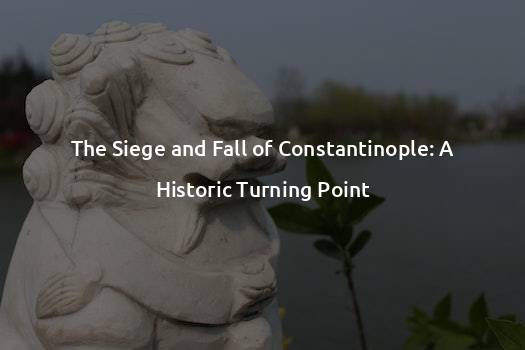The Siege and Fall of Constantinople: A Historic Turning Point
The Siege and Fall of Constantinople: A Historic Turning Point
Centuries ago, in the spring of 1453, a cataclysmic event took place that would forever change the face of Europe and the course of history. The great city of Constantinople, the imperial capital of the Byzantine Empire, fell to the Ottoman Turks after a long and brutal siege. This pivotal moment marked the end of an era and the beginning of a new chapter in the annals of civilization.
The Rise of Constantinople
Founded by the Roman Emperor Constantine the Great in 330 AD, Constantinople quickly became the heart and soul of the Byzantine Empire. Situated strategically on the Bosporus Strait, the city prospered as a bustling center of trade, culture, and religion. It stood as a symbol of Christian power and Roman legacy in the face of various threats over the centuries.
In the years leading up to the siege, Constantinople had already experienced a decline in power and influence. The Byzantine Empire had lost significant territories to the Ottoman Empire, a rising force in the region. By the mid-15th century, the city had become a mere shadow of its former glory, yet it still held great strategic importance.
The Ottoman Threat
The Ottoman Empire, led by Sultan Mehmed II, had been steadily expanding its dominion, gradually encircling Constantinople. The sultan recognized the city’s significance as a bridge between Europe and Asia, plus its symbolic stature as the capital of the Byzantine Empire. Mehmed II was determined to conquer Constantinople and make it the new capital of his empire.
The Siege Begins
In early April 1453, the Ottoman army, numbering over 100,000 soldiers, laid siege to Constantinople. The Byzantine Empire, under the leadership of Emperor Constantine XI, mustered a meager defense force of approximately 7,000 men. On May 6, the Ottomans launched a massive assault, bombarding the city with cannons and attempting to breach its massive defensive walls.
For almost two months, the defenders fought valiantly, managing to repel repeated Ottoman attacks. Their resilience was fueled by a mix of determination, faith, and desperation. The Byzantines had an intricate system of walls and fortifications, supplemented by a chain boom across the harbor to block entry and an imposing chain of iron spikes designed to impale invading ships.
The Fall of Constantinople
However, on May 29, the walls finally crumbled under the weight of Ottoman bombardment. To the dismay of the defenders, the Turks breached the city walls, and the fate of Constantinople hung in the balance. Emperor Constantine XI, realizing the imminent defeat, courageously led his troops into a last stand, fighting to the death.
In the end, the might of the Ottoman Empire prevailed. The city fell, and its inhabitants endured unimaginable horrors as the victors indulged in looting and pillaging. The once-great Constantinople was transformed into the new capital of the Ottoman Empire, renamed Istanbul.
The Legacy of the Siege
The fall of Constantinople left an indelible mark on history and triggered a seismic shift in power dynamics. Europe woke up to the Ottoman threat, prompting a renewed focus on naval exploration, culminating in Christopher Columbus’s voyage to the Americas in 1492.
Additionally, the exodus of Greek scholars and intellectuals from Constantinople following its fall contributed to the European Renaissance. They brought with them ancient Greek knowledge and manuscripts, sparking a newfound thirst for learning and igniting the flames of intellectual and cultural advancement across the continent.
The Ottomans, having conquered Constantinople, now held a firm grip on the lucrative trade routes between Europe and Asia. This pushed European powers, such as Spain and Portugal, to seek alternative routes, leading to the Age of Exploration and the eventual discovery of new lands and civilizations.
TLDR;
The fall of Constantinople in 1453 marked a significant turning point in history. The once-great city, the heart of the Byzantine Empire, succumbed to the Ottoman Turks after a prolonged siege. The event ignited Europe’s awareness of the Ottoman threat, fueling naval exploration and ultimately paving the way for the Age of Discovery. The Greek intellectuals who fled the city brought with them ancient knowledge, fueling the Renaissance. The fall of Constantinople shifted power dynamics and forever reshaped the course of civilization.







